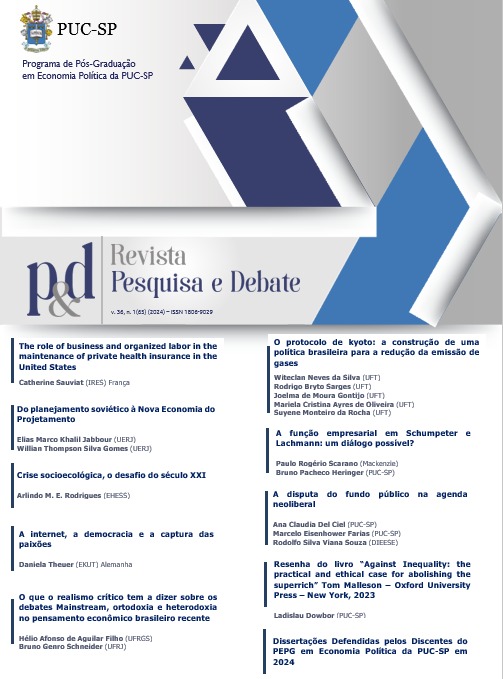Eficácia de diferentes sistemas de saúde e ações governamentais no controle da propagação da COVID-19
DOI:
https://doi.org/10.23925/1806-9029.36i2(66)68881Palavras-chave:
COVID-19, Economia e Organizações de Cuidados de Saúde, Condições Sociais, Sistemas de Informação em Saúde, Avaliação de Impacto na SaúdeResumo
Este estudo analisou a eficácia do desenvolvimento social, acesso e estrutura de saúde e ações governamentais em países de renda média-alta e alta, no enfrentamento da pandemia de COVID-19. Foram coletados dados sobre condições socioeconômicas, recursos do sistema de saúde e pandemia de COVID-19 em 24 países de renda média-alta e alta. Realizou-se um modelo de regressão linear múltipla usando prevalência e mortalidade. A prevalência da COVID-19 foi reduzida em 0,58 a cada unidade somada ao progresso social. Os países com maiores despesas de saúde apresentaram maior prevalência de COVID-19. A mortalidade por COVID-19 reduziu em 0,41 e 0,19 para cada unidade aumentada em leitos hospitalares e testes de COVID-19, respectivamente. O progresso social impactou na redução da prevalência da COVID-19. O número de leitos hospitalares e testes de COVID-19 influenciaram na redução da mortalidade.
Referências
ALI, I., ALHARBI, O. COVID-19: Disease, management, treatment, and social impact. Sci Total Environ, 2020. DOI: 10.1016/j.scitotenv.2020.138861.
ANDRIETTA, L.S., et al. The differential impact of economic recessions on health systems in middle-income settings: A comparative case study of unequal states in Brazil. BMJ Glob Health, v. 5, p. 1-11, 2020. DOI: 10.1136/bmjgh-2019-002122.
BARP, L.F.G., MITJAVILA, M.R. Necropolitics in contemporary deaths. INTERthesis, v. 16, p. 143-147, 2019. DOI: 10.5007/1807-1384.2019v16n1p143.
BURSTROM, B., TAO, W. Social determinants of health and inequalities in COVID-19. Eur J Public Health, v. 30, p. 617-618, 2020. DOI: 10.1093/eurpub/ckaa095.
CORRÊA, Alessandra. Coronavírus: por que a população negra é desproporcionalmente afetada nos EUA? BBC News, Winston-Salem (EUA), 13 abr. 2020. Disponível em: https://www.bbc.com/portuguese/internacional-52267566.
DOS SANTOS, H.L.P.C., et al. Necropolitics and the impact of covid-19 on the black community in brazil: A literature review and a document analysis. Cienc e Saude Coletiva, v. 25, p. 4211-4224, 2020. DOI: 10.1590/1413-812320202510.2.25482020.
ELMAHDAWY, M., et al. Ebola Virus Epidemic in West Africa: Global Health Economic Challenges, Lessons Learned, and Policy Recommendations. Value Heal Reg Issues, v. 13, p. 67-70, 2017. DOI: 10.1016/j.vhri.2017.08.003.
GOSTIN, L.O., FRIEDMAN, E.A., WETTER, S.A. Responding to Covid-19: How to Navigate a Public Health Emergency Legally and Ethically. Hastings Cent Rep, v. 50, p. 8-12, 2020. DOI: 10.1002/hast.1090.
HANEFELD, J. et al. Towards an understanding of resilience: Responding to health systems shocks. Health Policy Plan, v. 33, p. 355-367, 2018. DOI: 10.1093/heapol/czx183.
HENNE, S.R. Pandemics show us what government is for. Nat Hum Behav, v. 4, p. 441-442, 2020. DOI: 10.1038/s41562-020-0871-4.
HOTZ, T. et al. Monitoring the spread of COVID-19 by estimating reproduction numbers over time. ArXiv e-prints, 2020, 2004.08557. Disponível em: https://stochastik-tu-ilmenau.github.io/COVID-19/. Acesso em: 09 nov. 2020.
JARVIS, T. et al. Defining and classifying public health systems: A critical interpretive synthesis. Heal Res Policy Syst, v. 18, p. 1-12, 2020. DOI: 10.1186/s12961-020-00583-z.
KING, J.S. Covid-19 and the Need for Health Care Reform. N Engl J Med, v. 382, e104-1-e104-3, 2020. DOI: 10.1056/NEJMp2000821.
MCKEE, M., STUCKLER, D. If the world fails to protect the economy, COVID-19 will damage health not just now but also in the future. Nat Med, v. 26, p. 640-642, 2020. DOI: 10.1038/s41591-020-0863-y.
MENG, X. Alert for SARS-CoV-2 infection caused by fecal aerosols in rural areas in China. Infect Control Hosp Epidemiol, v. 41, 2020. DOI: 10.1017/ice.2020.114.
NAVARRO, J.H.N. Pandemic Necropolitics for COVID-19 in Brazil: who can die? Who is dying? Who was born to be let die? Heal Sci, v. 4, p. 4-9, 2020. DOI: 10.1590/SciELOPreprints.901.
O’DONOVAN, Ó. The Pandemic, Patient Advocacy, and the Importance of Thinking Comment on “The Rise of the Consucrat”. Int J Heal Policy Manag, v. 10, n. 8, p. 500-502, 2021. DOI: 10.34172/ijhpm.2020.114.
REIBLING, N., ARIAANS, M., WENDT, C. Worlds of Healthcare: A Healthcare System Typology of OECD Countries. Health Policy, v. 123, n. 7, p. 611-620, 2019. DOI: 10.1016/j.healthpol.2019.05.001.
REMUZZI, A., REMUZZI, G. COVID-19 and Italy: what next? Health Policy, n. 395, v. 10231, p. 1225-1228, 2020. DOI: 10.1016/S0140-6736(20)30627-9.
SHAKESPEARE, T., OFFICER, A. Editorial. Disability and Rehabilitation, v. 33, n. 17-18, p. 1491-1492, DOI: 10.3109/09638288.2011.590392.
TANG, A. et al. Detection of novel coronavirus by RT-PCR in stool specimen from asymptomatic child, China. Emerg Infect Dis, n. 26, v. 6, p. 1337-1339, 2020. DOI: 10.3201/EID2606.20.0301.
THE SOCIAL PROGRESS IMPERATIVE. 2019 Social Progress Index: executive summary. Soc Prog Imp, p. 1-16, 2019. Disponível em: https://www.socialprogress.org/static/9d3cd3204599ff2cdf87248edc2b1242/2019-social-progress-index-executive-summary-v2.0.pdf.
TULCHINSKY, T., VARAVIKOVA, E.A. National Health Systems. New Publica Heatlh, v. 21, n. 3, p. 643-728, 2020.
TURENNE, C.P. et al. Conceptual analysis of health systems resilience: A scoping review. Soc Sci Med, v. 232, p. 168-180, 2019; DOI: 10.1016/j.socscimed.2019.04.020.
UNITED NATIONS DEVELOPMENT PROGRAMME. Human Development Index Ranking. 2019. Disponível em: http://hdr.undp.org/en/content/2019-human-development-index-ranking. Acesso em: 6 set. 2020.
WALKER, B., VOCK, I. New data: the pandemic will set back global development by a decade. New Statesman, USA, 11 set. 2020. Disponível em: https://www.newstatesman.com/politics/2020/09/new-data-the-pandemic-will-set-back-global-development-by-a-decade.
WANG, Y. et al. Unique epidemiological and clinical features of the emerging 2019 novel coronavirus pneumonia (COVID-19) implicate special control measures. J Med Virol, v. 92, n. 6, p. 568-576, 2020. DOI: 10.1002/jmv.25748.
WARD, S. et al. Clinical testing for COVID-19. J Allergy Clin Immunol, v. 146, n. 1, p. 23-24, 2020. DOI: 10.1016/j.jaci.2020.05.012.
WENDT, C., FRISINA, L., ROTHGANG, H. Healthcare system types: A conceptual framework for comparison. Soc Policy Adm, v. 43, n. 1, p. 70-90, 2009. DOI: 10.1111/j.1467-9515.2008.00647.x.
WILLIAMSON, E.J. et al. Factors associated with COVID-19-related death using OpenSAFELY. Nature, v. 584, n. 7821, p. 430-436, 2020. DOI: 10.1038/s41586-020-2521-4.
WORLD BANK GROUP. World Bank database. World Bank, 2020. Disponível em: https://data.worldbank.org/. Acesso em: 6 set. 2020.
Downloads
Publicado
Como Citar
Edição
Seção
Licença
Copyright (c) 2024 Pesquisa & Debate Revista do Programa de Estudos Pós-Graduados em Economia Política

Este trabalho está licenciado sob uma licença Creative Commons Attribution 4.0 International License.

